Black Women in Film & TV
Black people have been caricatured and stereotyped in western entertainment for the longest time. From minstrel shows that put white entertainers in black face to entertain other white people, to the infamous and controversial Birth of a Nation 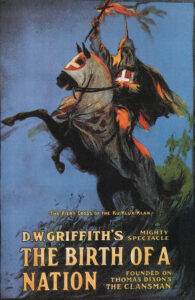 war drama that was screened in the White House of all places, depicted freed slaves as savages whose only goal in life was to take advantage of white women’s innocence and became America’s first blockbuster, representation of black people has been negative to say the least.
war drama that was screened in the White House of all places, depicted freed slaves as savages whose only goal in life was to take advantage of white women’s innocence and became America’s first blockbuster, representation of black people has been negative to say the least.
“White patrons of the era were so conceited that they had created for Black people this exotic identity, which in dance or literature meant that their distinctive character was their sensuality or, in other words, their closeness to jungle rhythm.”
“The New Negro Movement And The African Heritage in a Pan- Africanist Perspective.” Sonia Delgado-Tall, Jan. 2001, pp. 288-310
This is one reason why accurate representation in the media is so important to black people, especially black women. While there aren’t any minstrel shows or Birth of a Nation-like movies being released anymore, 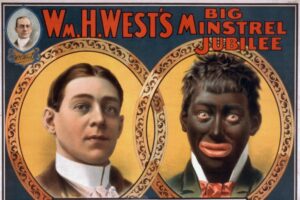 people of color, especially black women, are still being caricatured and stereotyped in all forms of media today. With all-white, male writers, directors, and casting agents, it is not a surprise why black women can be so inaccurately depicted and with colorism thrown into the mix, it just seems like black women can never catch a break.
people of color, especially black women, are still being caricatured and stereotyped in all forms of media today. With all-white, male writers, directors, and casting agents, it is not a surprise why black women can be so inaccurately depicted and with colorism thrown into the mix, it just seems like black women can never catch a break.
Behind the Cameras
One of the main problems that cause these inaccurate, stereotypical black characters is the fact that the writing rooms are filled with white screenwriters trying to write black characters. And this is not to say that white people can’t write about an experience that is not their own, but the majority of the issues come up when there is no research done or these screenwriters believe that they can figure it out based on their own perceptions of black people. This can lead to black characters that black people can’t relate to. For example, when the spinoff Grown-ish was announced and people found out that it would feature young college students attending an HBCU, there was a lot of buzz and excitement. Unfortunately, the show fell short for some of its intended audiences, one reason being the writing of the show’s main character, a black girl, and blamed this on there only being two regular middle-aged black writers in the writing room.
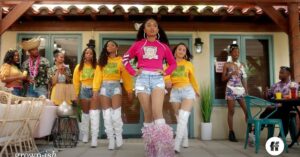
Black Woman Caricatures
Another, mostly overlooked, problem is the stereotypical black girl character tropes. That is: “The Baby Momma”, “The Token Best Friend”, “The Black Barbie/White-Washed One”, “The Fat and Stupid One”, and, the most used in my opinion, “The Angry/Sassy One” and the list goes on. These character tropes of black women have been in western film since the beginning, starting with the “Mammy” character “who puts the care of children and families of others above her own.”
“Inherently connected with the question of job opportunities where the Negro woman is concerned, is the special oppression she faces as Negro, as woman, and as worker. She is the victim of the white chauvinist stereotype as to where her place should be. In the film, radio, and press, the Negro woman is not pictured in her real role as breadwinner, mother, and protector of the family, but as a traditional “mammy” who puts the care of children and families of others above her own. 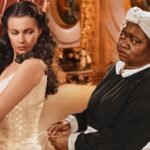 This traditional stereotype of the Negro slave mother, which to this day appears in commercial advertisements, must be combatted and rejected as a device of the imperialists to perpetuate the white chauvinist ideology that Negro women are “backward,” “inferior,” and the “natural slaves” of others.”
This traditional stereotype of the Negro slave mother, which to this day appears in commercial advertisements, must be combatted and rejected as a device of the imperialists to perpetuate the white chauvinist ideology that Negro women are “backward,” “inferior,” and the “natural slaves” of others.”
“An End to the Neglect of the Problems of the Negro Woman!” Claudia Jones, 1949, p318
These stereotypical characters who are played out in film and television portray a narrow minded view of who a black woman can be. They trivialize black women’s struggles, a majority of them are demeaning and they seem to only be there to meet a diversity quota or to avoid backlash from “woke twitter”. A black woman, like any other person, is multifaceted. Yes, they can be sassy, but they can also be reserved and their whole personality doesn’t depend on one or the other.
Cartoon Reality
Reality TV is another way black women are shown in the entertainment industry. Shows like The Real Housewives of Atlanta garner mixed reviews from all types of people. Some see it as merely a guilty pleasure that they watch weekly while others see it as another reason why black women are caricatured and stereotyped. In this case these groups of women are held up to be an example of all black people by some. To me this is very surprising being that there are other Real Housewives shows with a mainly white or all white cast who aren’t held up to represent the entire white community.
Arguably the most important portrayal of black people comes through cartoons. This is because young children are the targeted demographic. When a young black person sees themselves or someone they can strongly relate to in cartoons, especially if they are a main character, makes them feel seen and acknowledged by society. Unsurprisingly, there are not a lot of black cartoon characters who are the main character and the number is even smaller for black girl characters. 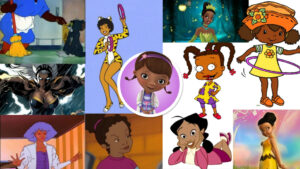
Black characters are more than an opportunity for a race joke, more than a caricature, and more than a stereotype. They are supposed to show the personalities, experiences, struggles, and triumphs of black people and it is important that this is done correctly because accurate representation is important.
Works Cited
“How To BLACK: An Analysis of Black Cartoon Characters (Feat. ReviewYaLife).” YouTube, 13 Jan. 2019, youtu.be/uOwhBkoNK0g.
“Is the Portrayal of Black Women on Reality TV Damaging?” YouTube, 4 Feb. 2016, youtu.be/v45lbauzSp8.
“Mammy, Jezebel and Sapphire: Stereotyping Black Women in Media: The Listening Post (Feature).” YouTube, 26 July 2020, youtu.be/2teqoyPe3TU.
“The Not So Silver Screen.” AAPF, aapf.org/the-not-so-silver-screen.
Delgado-Tall, Sonia. “The New Negro Movement and the African Heritage in a Pan-Africanist Perspective.” Journal of Black Studies, Sage Publications, Inc., Jan. 2001, www.jstor.org/stable/2668034.
Jones, Claudia. “An End to the Neglect of the Problems of the Negro Woman!” Let Nobody Turn Us Around, edited by Manning Marable and Leith Mullings, Rowman & Littlefield Publishers, Inc, 1949.



